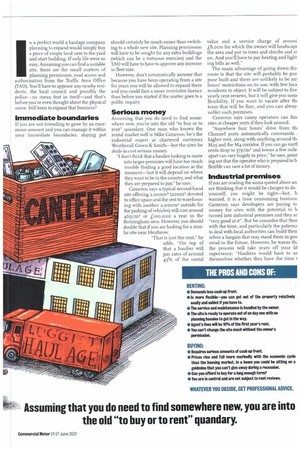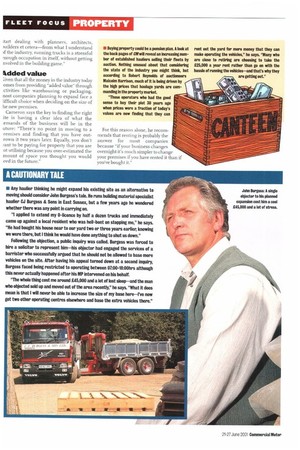n a perfect world a haulage company planning to expand
Page 31

Page 32

If you've noticed an error in this article please click here to report it so we can fix it.
would simply buy a piece of empty land next to the yard and start building. If only life were so easy. Assuming you can find a suitable site, there are the small matters of planning permission, road access and authorisation from the Traffic Area Office (TAO). You'll have to appease any nearby residents, the local council and possibly the police—no mean feat in itself—and that's before you've even thought about the physical move. Still keen to expand that business?
Immediate boundaries
If you are not intending to grow by an enormous amount and you can manage it within your immediate boundaries, staying put should certainly be much easier than switching to a whole new site. Planning permission will have to be sought for any extra buildings (which can be a tortuous exercise) and the TAO will have to have to approve any increase in fleet size.
However, don't automatically assume that because you have been operating from a site for years you will be allowed to expand there and you could face a more restrictive licence than before you started if the matter goes to a public inquiry.
Serious money
Assuming that you do need to find somewhere new, you're into the old "to buy or to rent" quandary. One man who knows the rental market well is Mike Cameron: he's the industrial expert at chartered surveyors Weatherall Green St Smith—but the sites he deals in cost serious money.
"I don't think that a haulier looking to move into larger premises will have too much trouble finding a good location at the moment—but it will depend on where they want to be in the country, and what they are prepared to pay," he says.
Cameron says a typical second-hand site offering 2,000m2 (zoom2 devoted to office space and the rest to warehousing with another 2,000m2 outside for the parking of vehicles) will cost around 46p/m2 or fwo,000 a year in the Birmingham area. However, you should double that if you are looking for a similar site near Heathrow.
"That is just the rent," he adds. "On top of that a haulier will pay rates of around 45% of the rental value and a service charge of arounc L.S.,000 for which the owner will landscape the area and put in trees and shrubs and sc on. And you'll have to pay heating and light ing bills as well."
The main advantage of going down thit route is that the site will probably be pur pose built and there are unlikely to be an hours' restrictions on its use, with few loca residents to object. It will be subject to five yearly rent reviews, but it will give you som. flexibility. If you want to vacate after thi term that will be fine, and you can alway: sublet such premises.
Cameron says canny operators can finc sites at cheaper rents if they look around.
"Anywhere four hours' drive from th. Channel ports automatically commands . higher rent, along with anything around th. M25 and the M4 corridor. If you can go nord rents drop to 37p/m2 and towns a few mile apart can vary hugely in price," he says, point ing out that the operator who is prepared to b flexible can save a lot of money.
Industrial premises
If you are reading the sums quoted above an are thinking that it would be cheaper to do yourself, you might be right—but, b warned, it is a time consuming businest Cameron says developers are paying to money for sites with the potential to b turned into industrial premises and they ar "very good at it". But he concedes that thos with the time, and particularly the patienc4 to deal with local authorities can build then selves a bargain that may stand them in goo stead in the future. However, he warns tht the process will take years off your lii expectancy: "Hauliers would have to as themselves whether they have the time t :tart dealing with planners, architects, milders et cetera—from what I understand )f the industry, running trucks is a stressful .nough occupation in itself, without getting nvolved in the building game."
kdded value
;iven that all the money in the industry today omes from providing "added value" through ctivities like warehousing or packaging, nost companies planning to expand face a lifficult choice when deciding on the size of he new premises.
Cameron says the key to finding the right ite is having a clear idea of what the .emands of the business will be in the uture: "There's no point in moving to a remises and finding that you have outrown it two years later. Equally, you don't rant to be paying for property that you are ot utilising because you over-estimated the mount of space you thought you would eed in the future." For this reason alone, he recommends that renting is probably the answer for most companies because "if your business changes overnight its much simpler to change your premises if you have rented it than if you've bought it."
































































































